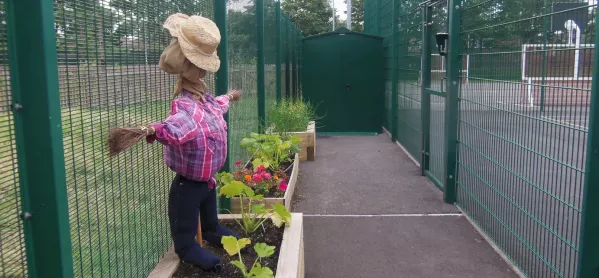Make your school grounds a green oasis

“Every inner city child should be given the opportunity to connect with nature,” says Sophia Ioannou, an environmental tutor who specialises in helping urban schools make the most of their grounds for the benefit of pupils, wildlife and the local community.
Located in the London boroughs of Islington, Haringey and Westminster, Ioannou’s schools are small, green oases in the middle of built-up and congested areas.
“While city schools might be short on space, there is a growing awareness of the importance of providing pupils with an environmental education,” says Ioannou.
As many of her pupils live in flats and have no access to gardens, maximising the use of schools’ outdoor space is vital if children are to be given the opportunity of experiencing nature first-hand.
At Pooles Park School in Finsbury Park, Ioannou leads an environmental team of 50 pupils where everybody has a role to play in caring for the school’s garden, orchard, compost area, wildlife pond and hen enclosure.
For a school that’s in one of London’s most densely populated areas, the transformation of its grounds into something that more closely resembles a nature reserve is testament to an environmental vision and the clever use of space.
Pupils take charge of keeping the hens’ quarters clean, making sure the birds have enough to eat every day, and that all the plants are watered on a daily basis.
As the school has solar panels on its roof, pupils are also tasked with recording how much energy has been produced each week and how much carbon dioxide saved. A roof garden has also been built where the children will be sowing wildflowers shortly to attract bees, butterflies and other pollinators.
When she’s not at Pooles Park, Ioannou can often be found at St Joseph’s Catholic Primary School in Highgate, where a team of 25 pupils (known as the Eco Warriors) help her to care for the school’s gardens, plants, hens and rabbits.
From March to September, the focus of Ioannou’s environmental education is on organic food growing, with children sowing seeds, planting out, caring for the plants and harvesting.
Autumn is a time for planting trees, shrubs and spring flowering bulbs. The pupils also make insect habitats and log piles for hibernating insects by collecting and using fallen branches brought down by the wind. In winter, the children feed birds, watch and learn about them.
Despite the space restrictions in city schools, Ioannou always makes sure that she finds somewhere she can install a small wildlife pond, which the pupils can use to study life cycles and aquatic habitats.
“I try to ensure they can relate to the science,” says Ioannou, who adopts a practical approach in her teaching. “The children absorb knowledge this way and start to develop a connection with nature.”
As well as helping to support the pupils’ understanding of science, Ioannou says environmental education brings additional benefits too.
“Pupils find it calming, especially the ones who struggle to be in a classroom,” says Ioannou. “Often the children who find learning difficult within four walls make the best students. They become more focused out of doors and say to me: ‘This makes me happy.’”
Margaret Lynch-Deakin is the eco-lead at Heald Place Primary School in Manchester close to the city centre. With parents working long hours, many of her pupils don’t get to spend time outside when they’re not at school.
“Five years ago, we started to develop a large field that had been neglected. With the children’s help we transformed it and it’s now a wildflower meadow where pupils go to do their mini-beast and wildlife studies,” she says.
Heald Place is a diverse, multi-cultural school with lots of international new arrivals. As many pupils have little or no English when they start, Lynch-Deakin finds that involving them in the school’s gardening club is a good way of helping to break down barriers.
“Gardening helps with social skills. You can observe the children all laughing and talking together. They’re excited to be out in nature,” she says. “For EAL children, gardening helps to build their vocabulary skills, and for all pupils, studying nature improves their understanding of science as well as their general wellbeing.”
With an orchard full of apple, pear and fig trees, children help to pick the fruit. An allotment where strawberries are grown means they also get the chance to make their own strawberry jam. Just recently, the school established a peace garden, following the Manchester Arena bombing of 2017, to provide a quiet space for children to be among nature.
Pupils’ outdoors learning is integrated across other areas of the curriculum.
“The children built hedgehog houses in their DT class,” says Lynch-Deakin. “This is the first year we had hedgehogs appear, so the children have been thrilled about that. They also build bird houses in DT, too.”
Pupils’ environmental awareness is increased by initiatives such as taking part in a city-wide study of bees, and the school having had a water butt installed on the premises.
“The importance of it has really been brought home to them by this summer’s heatwave,” she says.
Giving children a real sense of ownership of their outside space is important at Heald Place, with pupils given a say on future activities.
When it became apparent that the school had not yet been visited by bats, the children became very keen to do more work next year that will encourage bats to come.
Pupils have also asked for the gardening club to be expanded. A teaching assistant is due to develop it further in the autumn term as the children want to grow additional produce as a way of raising money for charity by selling it to the local community.
The school’s environmental projects are supported by a dedicated group of parents and local residents who give their time and skills to develop the initiatives further and foster a sense of community at the same time.
“We have locals who come along and share their knowledge with us about growing vegetables. We also have university students who help us out, too,” says Lynch-Deakin.
Likewise, Ioannou’s projects also have a big supporter base among parents and local residents who also value being able to step outside the concrete jungle and spend some time in nature.
“Parents at St Joseph’s come along and help out at the after school club, while at Pooles Park we open the garden to the wider community one Saturday every month. They help with planting, harvesting compost, maintaining the beds, borders and pond, cleaning the hens’ run and so much more. We try to provide opportunities for everyone to access nature,” she says.
Victoria Briggs is a writer and education journalist
Become a Green Ambassador School
Green Ambassadors is all about encouraging a new generation of sustainability champions. Register your school for the WWF flagship programme for schools and you’ll have access to a range of curriculum-linked resources on topical environmental issues, including energy, travel, food, water, plants, animals and recycling.
